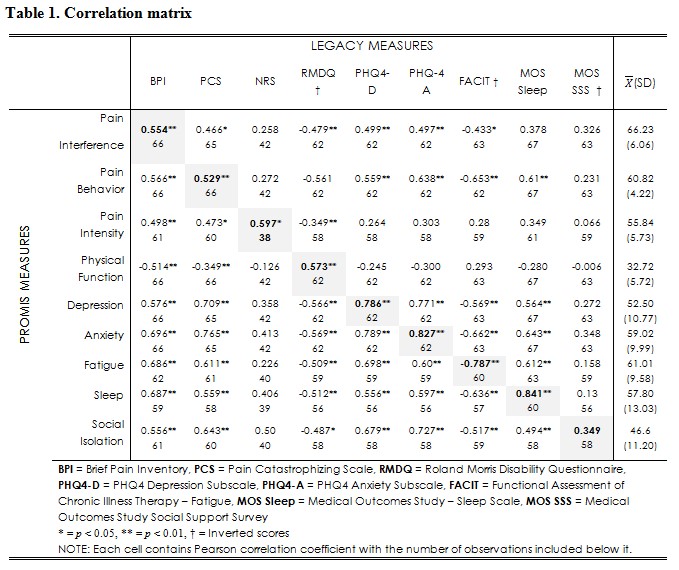Session Information
Session Type: ACR Concurrent Abstract Session
Session Time: 2:30PM-4:00PM
Background/Purpose: Chronic back pain is the second most common reason for a physician’s visit and results in significant physical and psychosocial consequences in older adults. Identifying appropriate, efficient and reliable patient reported outcome measures is critical for research and clinical purposes. The NIH’s Patient Reported Outcomes Measurement Information System (PROMIS) instruments provide robust patient-reported outcome measures; however, these have not been compared to validated “legacy” instruments in older adults with chronic back pain. This study aims to evaluate convergent validity and time to completion (TTC) of PROMIS as compared to “legacy” instruments (both self-reported).
Methods: We enrolled older Veterans (age 60+) with chronic back pain with/without leg pain (≥3 months) scheduled for lumbar epidural steroid injections. Participants completed PROMIS computer adaptive test (CAT) item banks and corresponding “legacy” instruments in the following domains: pain interference, behavior and intensity; functional status; depression and anxiety; fatigue; sleep and social functioning. Convergent validity between PROMIS and “legacy” instruments was evaluated using Pearson correlation coefficients in a correlation matrix. Paired sample t-tests compared average TTC between both instruments.
Results: Participants included 71 Veterans who were on average 67 years old, 94% men, 73% non-Hispanic white, 16.9% African American. Over half were obese with mean BMI 32, 25% reported multi-site pain and 59% were diagnosed with depression, anxiety and/or PTSD. The majority (69%) reported pain duration ≥5+ years with ~ 93% reporting associated radiculopathy. Pearson correlations between PROMIS and “legacy” instruments are listed in Table 1 and show moderate to strong convergent validity, with the exception of social functioning domains. PROMIS items had significantly shorter TTC than “legacy” items across all domains (Table 2).
Conclusion: PROMIS measures, especially for depression, anxiety, fatigue and sleep domains, have strong convergent validity in older Veterans with chronic back (and associated leg) pain. Moreover, PROMIS measures require less time to complete. Given time efficiency of using PROMIS, along with strong convergent validity, PROMIS instruments are a valid and practical choice for both research and clinical purposes.
To cite this abstract in AMA style:
Nayfe R, Chansard M, Annaswamy T, McCallister K, Fraenkel L, Mortensen E, Makris UE. Validating Patient Reported Outcomes in Older Veterans with Chronic Back Pain [abstract]. Arthritis Rheumatol. 2017; 69 (suppl 10). https://acrabstracts.org/abstract/validating-patient-reported-outcomes-in-older-veterans-with-chronic-back-pain/. Accessed .« Back to 2017 ACR/ARHP Annual Meeting
ACR Meeting Abstracts - https://acrabstracts.org/abstract/validating-patient-reported-outcomes-in-older-veterans-with-chronic-back-pain/


